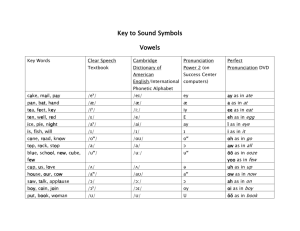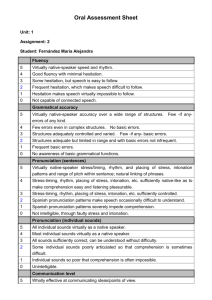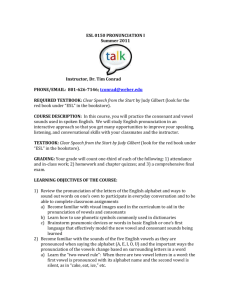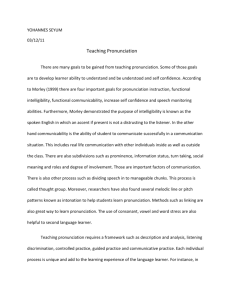Pronunciation - La Trobe University
advertisement
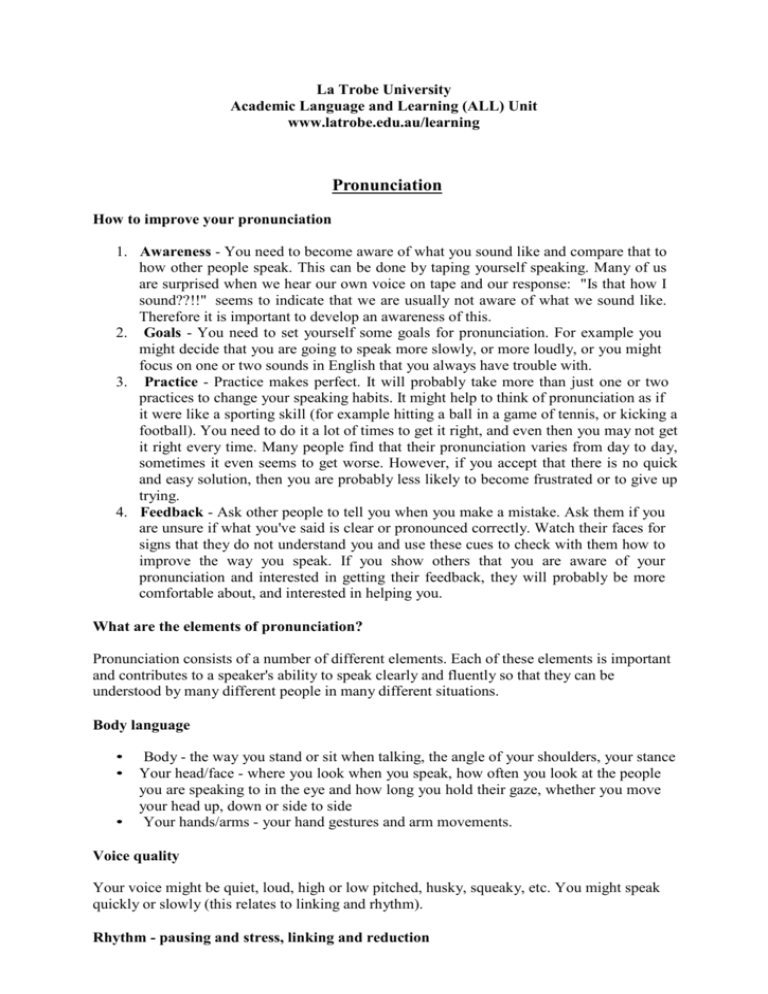
La Trobe University Academic Language and Learning (ALL) Unit www.latrobe.edu.au/learning Pronunciation How to improve your pronunciation 1. Awareness - You need to become aware of what you sound like and compare that to how other people speak. This can be done by taping yourself speaking. Many of us are surprised when we hear our own voice on tape and our response: "Is that how I sound??!!" seems to indicate that we are usually not aware of what we sound like. Therefore it is important to develop an awareness of this. 2. Goals - You need to set yourself some goals for pronunciation. For example you might decide that you are going to speak more slowly, or more loudly, or you might focus on one or two sounds in English that you always have trouble with. 3. Practice - Practice makes perfect. It will probably take more than just one or two practices to change your speaking habits. It might help to think of pronunciation as if it were like a sporting skill (for example hitting a ball in a game of tennis, or kicking a football). You need to do it a lot of times to get it right, and even then you may not get it right every time. Many people find that their pronunciation varies from day to day, sometimes it even seems to get worse. However, if you accept that there is no quick and easy solution, then you are probably less likely to become frustrated or to give up trying. 4. Feedback - Ask other people to tell you when you make a mistake. Ask them if you are unsure if what you've said is clear or pronounced correctly. Watch their faces for signs that they do not understand you and use these cues to check with them how to improve the way you speak. If you show others that you are aware of your pronunciation and interested in getting their feedback, they will probably be more comfortable about, and interested in helping you. What are the elements of pronunciation? Pronunciation consists of a number of different elements. Each of these elements is important and contributes to a speaker's ability to speak clearly and fluently so that they can be understood by many different people in many different situations. Body language • • • Body - the way you stand or sit when talking, the angle of your shoulders, your stance Your head/face - where you look when you speak, how often you look at the people you are speaking to in the eye and how long you hold their gaze, whether you move your head up, down or side to side Your hands/arms - your hand gestures and arm movements. Voice quality Your voice might be quiet, loud, high or low pitched, husky, squeaky, etc. You might speak quickly or slowly (this relates to linking and rhythm). Rhythm - pausing and stress, linking and reduction The concept of rhythm includes where we pause in a sentence and where we stress words of syllables (parts of words). 'Stress' relates to how loud you say a word, or how much emphasis you put on that word or syllable. Related to rhythm is the element of linking words together. Fluent speakers 'run' their words together and this sometimes makes it difficult for learners of English to understand native speakers. As a speaker you need to link words and to also reduce or weaken some words or parts of words. (For example when the phrase "night and day" is said by native speakers, they usually do not pronounce 'and' fully but make it sound like 'n'. This is an example of a reduced or weaken word. Intonation This is the uses of different pitch and changes in pitch to convey meaning in a sentence. The same words can be said with different pitch and the listener understands something different. For example, "She's finished" said with a rise in pitch at the end becomes a question. Said without this rise it is a statement. Intonation is used to express a great number of different meanings, including emotions and attitudes. Sounds The individual sounds of English may be different to the sounds in your first language. Or perhaps more importantly, they may be combined with other sounds in different ways or appear in different parts of a word. The vowels and consonants of English are important elements of pronunciation Each of these elements contributes to a person being a competent and clear speaker of English and no single element alone is the key to good pronunciation. However, achieving competence in all of these elements is important and should be each learner's goal. Speaking more fluently - stress, pausing & intonation Key elements of clear and fluent speech are the use of appropriate stress and intonation. • Eleaston's English Online Pronunciation page (U.S. site) Individual sounds in english Are their sounds in English that you often find difficult to pronounce? Different consonant and vowel sounds create different difficulties for speakers of other languages. Some of the most common difficulties are to do with the vowels. There are many vowel sounds in English. In the alphabet, the letters a, e, i, o and u represent the vowels in spelling. It is important to realise that the spelling system and the sound system of English, while connected, are not in a one-to-one relationship. In other words one letter isn't always pronounced the same way. The sounds of English are represented by a different type of alphabet: a phonemic alphabet. A widely used phonemic alphabet is the International Phonetic Alphabet or IPA. Dictionaries often use this alphabet of a similar system for describing how a word is pronounced. • For a description of the IPA and lists of the English words presented using IPA symbols go to the Correct English Pronunciation Page • Steve Chadwick's Diphthong Calculator. Hear how vowel sounds are combined to make diphthongs in English • The Linguistics section of the University of Manitoba, Canada has several pages about the IPA with examples of words in English to demonstrate each sound. The importance of listening Listening to spoken English and being able to hear the different features of the language is an important part of learning to speak clearly. STRATEGIES: Spend some time listening to native speakers of English and try to focus on the sound of the language. Listen for the way the speakers stress words by saying them more loudly and with greater intensity. If you can see the person speaking you might also notice the way s/he emphasises words using facial expression and hand gestures. Listen for the way the speaker uses pauses to group thoughts and ideas together. Speakers also use a number of strategies to indicate to the listener that even if they are not talking, they have more to say and are going to continue. This is often done by using 'filler' words or sounds such as 'ah' , 'um', or 'err'. They may also look away from the listener while they are gathering their thoughts. Try and listen for the overall rhythm and 'tune' of a speaker, and if possible, try to mimic these aspects of their speech. Don't worry if you're not completely sure of what they are saying. Practice listening for pronunciation several times a week - do it while on public transport, sitting in a crowded place, or even when watching TV. The ability to focus on the abovementioned components of speech seems to come naturally for some learners, while for others it requires focussed and deliberate effort. What to do if other people don't understand you An important part of successful spoken communication is checking whether the person that you are talking to has understood what you have said. Watch the reactions of the people you speak to. If it seems that they have not understood you, you'll need to repeat what you said. How do you know if someone hasn't understood? They might appear confused by frowning, or squinting their eyes, or staring at you. They might also respond inappropriately with a comment that is not related to what you are saying. In some cases they might suddenly end the conversation. It is important to remember that some people who are not used to speaking to people who have English as a second language feel embarrassed or perhaps a bit threatened if they do not understand what they are being told. In these situations you can make the listener feel more comfortable by showing them that you realise that your pronunciation might make it difficult for them to understand you. You could say: • • • "Have I said that clearly?" OR "Would you like me to say that again?" OR "I'm sorry, English pronunciation is a bit difficult for me. I said, 'XXXXXX'. Did I pronounce that correctly?" By showing that you are not embarrassed to talk about your pronunciation, it is likely that the person you are talking to will also feel more comfortable. This will probably result in them feeling happy to help you with words or sounds that you have difficulty with. In other words, you can encourage the people you speak to, to help you monitor and modify the way you speak. Pronunciation Links • • • Steve Chadwick's Diphthong Calculator. Hear how vowel sounds are combined to make diphthongs in English. Sounds of English. Sounds, word stress intonation and more. Eleaston's English Online Pronunciation page (a U.S. site)

